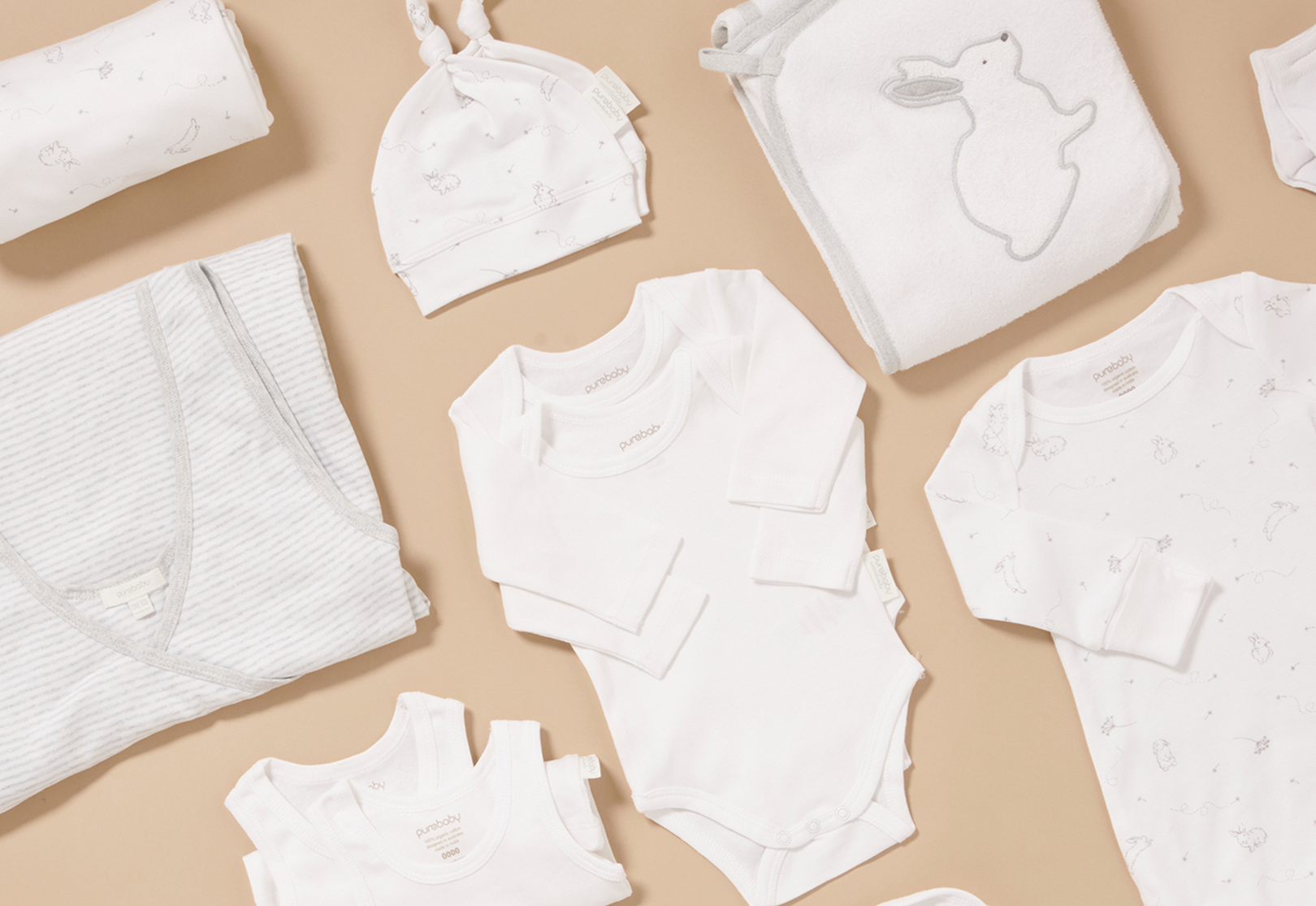
Newborn Baby Clothing Checklist
10 min read | 1 September 2023
New In
Essentials
Clothing
Accessories
Shop By Gender
Shop By Size
Collections
Baby
Clothing
Accessories
Shop By Gender
Shop By Size
Collections
Nursery
Care
Play
Kids
Clothing
Accessories
Shop By Gender
Shop By Size
Collections
Care
Play
Gifts
Baby Gifting
Kids Gifting
Shop By Price
Shop By Event
Shop By Gender
Sale
Sale
Shop By Gender
Learn
Education
Resources
Pre-Loved
Rewards
11 min read | 26 November 2023

However, the journey begins long before your baby arrives. Whether you’re a first-time parent or adding to your family, there are some key things to consider at each stage, from preconception to the final trimester of pregnancy.
Before you conceive, there are some essential steps to take in preparing for pregnancy:
Visit your GP for a pre-pregnancy health check:
It’s a good idea to schedule a preconception checkup with your doctor, who will be able to provide expert advice on planning your pregnancy and help to identify and address any underlying health issues to ensure you're in the best possible shape for having a baby.
Know your ovulation signs:
Knowing when you’re ovulating is important when trying to fall pregnant, and there are signs that can help you track and predict ovulation. You can also purchase a kit that can help you better understand when ovulation is likely to occur, in order to help improve your chances of conception.
Consider genetic carrier screening:
Genetic carrier screening is a test that looks for mutations in your genes that could cause a health problem for your baby and is recommended for people planning a family or in their first trimester of pregnancy. Talk to your doctor about whether you should take a test, which test you should take and how much it will cost.
Eat a balanced diet:
A healthy diet full of fresh fruit and vegetables and rich in essential nutrients like folic acid and iron can help your chances of conceiving and having a healthy pregnancy. If you smoke or drink alcohol excessively, now’s a good time to quit as these habits can harm your fertility and the health of your future baby.
Begin taking supplements:
Start taking a pre-pregnancy supplement to ensure your body is getting all the right nutrients for pregnancy. Supplements containing folate (folic acid) are important for pregnancy as they can help prevent birth defects, including neural tube defects like spina bifida.
Plan your finances:
It’s never too early to begin budgeting and saving for the expenses that come with having a child, which include things like equipment,
clothing, nappies, medical bills and childcare. You may also need to consider buying a bigger car or moving to a bigger house to ensure you’ve got space for your growing family.
You’re having a baby – congratulations! The first trimester is a time of rapid development for your baby and significant changes for the birth parent.
Visit your GP to start your pregnancy care:
Once you find out you’re pregnant, visit your doctor to confirm the pregnancy and have a check-up. Your doctor will also be able to organise routine tests, talk to you about your pregnancy care options and refer to you the health professionals you want to care for you. Regular checkups with your doctor or specialist throughout your pregnancy are essential to monitor your baby's health and your own.
Adjust your diet for pregnancy
: When you’re pregnant, there are certain
foods and drinks you need to avoid, like fish high in mercury, ready-to-eat chilled foods, soft cheeses, raw eggs and raw seafood as well as double-shot espresso and energy drinks. You may need to decrease your caffeine intake too – health professionals recommend limiting caffeine to no more than 1 espresso, 2 instant coffees, 4 cups of tea or 4 cans of cola a day. You should also limit sugary and fatty foods.
Educate yourself:
Start reading books and visiting reputable websites like the Raising Children Network, and Pregnancy Birth & Baby, to learn about
pregnancy, childbirth, and newborn care.
Get support
: It’s normal to feel a range of different emotions during the first trimester – from joy and excitement to irritability and anxiety. Share your feelings and concerns with your partner, trusted friends, or a counselor.
The second trimester is often considered the "golden trimester" due to increased energy and fewer pregnancy symptoms. This is usually when most people feel comfortable sharing their exciting news with the world.
Book an ultrasound:
A detailed ultrasound check is recommended during all pregnancies at about 18-20 weeks to give you and your care provider important information about how your baby is growing and developing.
Continue your healthy lifestyle:
Keep eating well and
staying activewith your healthcare provider's guidance. Yoga and swimming can be excellent options for exercise during pregnancy.
Start making a list of the essentials:
There are lots of things you’ll need when your new baby arrives, so it can be helpful to start making a list sooner rather than later. You may want to start
creating a baby registry, including essentials like a pram, cot, car seat and
baby clothes, which you can share with friends and family who may want to help with gifts.
Look into your parental leave entitlements:
Before you tell your employer about your pregnancy, it’s a good idea to get an understanding of the leave and work arrangements you’re entitled to, as this can vary from organisation to organisation. Understanding what the parental leave policy is at your workplace can help you feel prepared for the first discussion you have with your employer.
Book your parental leave:
Australian laws state that you must tell your employer you’re planning to take parental leave at least 10 weeks before your last workday. Many women find that 34-36 weeks is an ideal time to start parental leave, so you would need to tell your employer your plans by the time you’re 24-26 weeks pregnant – around the end of the second trimester.
Enrol in antenatal classes:
Antenatal
education classescan help you learn about things like labour, childbirth, breastfeeding and the experience of becoming parents. Your doctor or midwife will be able to share information about how to book classes in your area.
Register for childcare:
It’s not uncommon for daycare centres to have limited places and waitlists. If you’re planning on
sending your little one to childcareonce you or your partner return to work, it’s a good idea to put them on a waiting list at the centre you’re interested in to increase your chances of getting the days you need when you need them.
As your due date approaches, it’s time to focus on the final preparations.
Start nesting:
The instinct to nest often kicks in during the third trimester. Use this energy to
set up the nurseryand
organise baby supplies. If you’re feeling up to it, you might want to consider stocking up on non-perishable staples and cooking some meals and freezing them for when things get busy after your baby is born.
Consider your birth preferences:
Think about your preferences for labour, pain relief and postpartum care and discuss them with your partner and your healthcare provider. It can be helpful to write these down and take a copy with you to the hospital.
Pack your hospital bag:
Prepare a bag with everything you’ll need to take with you to the hospital, like clothing for you and your baby, toiletries and important documents. Take a look at our
hospital bag checklistto ensure you don’t forget anything!
Book a hospital tour:
It can be useful to familiarise yourself with where you’ll be giving birth ahead of time. Many hospitals and birth centres offer tours of their facilities and meet-and-greets with staff, which can help you feel more comfortable and prepared for going into labour.
Install your car seat:
Arrange for your carseat to be properly fitted into your car during the third trimester so you can bring your baby home from the hospital safely.
Arrange for postpartum support:
Talk to family, friends or even a postpartum
doulato arrange for help after your arrives. They may be able to drop off food, help with household tasks or assist with your little one when you arrive home.
Every pregnancy is unique, so it's important to talk to your healthcare provider and adapt your plans based on what’s right for you. Preparing for a baby is such an exciting time, and by planning and getting organised throughout your pregnancy, you’ll be setting yourself up for a healthy and happy start to parenthood.
Stock up on growsuits, baby clothing and essentials for your new arrival at Purebaby.
Sign up to Pure Love Rewards and get $10 off your first online order, earn points every time you shop and more!